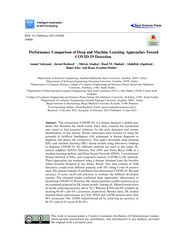Performance Comparison of Deep and Machine Learning Approaches Toward COVID-19 Detection
-
Yazar
Buket İşler
-
Tür
Makale
- Yayın Yılı 2023
- Veritabanları Wos,Scopus
- DOI 10.32604/iasc.2023.036840
-
Yayıncı
Tech Science Press
- Dergi Intelligent Automation And Soft Computing 37, ( 2 ), pp.2247 - 2261
- Tek Biçim Adres https://hdl.handle.net/20.500.14081/1980
-
Konu Başlıkları
Artificial intelligence
COVID-19
Deep learning
Diagnosis
Machine learning
The coronavirus (COVID-19) is a disease declared a global pan-demic that threatens the whole world. Since then, research has accelerated and varied to find practical solutions for the early detection and correct identification of this disease. Several researchers have focused on using the potential of Artificial Intelligence (AI) techniques in disease diagnosis to diagnose and detect the coronavirus. This paper developed deep learning (DL) and machine learning (ML)-based models using laboratory findings to diagnose COVID-19. Six different methods are used in this study: K -nearest neighbor (KNN), Decision Tree (DT) and Naive Bayes (NB) as a machine learning method, and Deep Neural Network (DNN), Convolutional Neural Network (CNN), and Long-term memory (LSTM) as DL methods. These approaches are evaluated using a dataset obtained from the Israelita Albert Einstein Hospital in Sao Paulo, Brazil. This data consists of 5644 laboratory results from different patients, with 10% being Covid-19 positive cases. The dataset includes 18 attributes that characterize COVID-19. We used accuracy, f1-score, recall and precision to evaluate the different developed systems. The obtained results confirmed these approaches' effectiveness in identifying COVID-19, However, ML-based classifiers couldn't perform up to the standards achieved by DL-based models. Among all, NB performed worst by hardly achieving accuracy above 76%, Whereas KNN and DT compete by securing 84.56% and 85% accuracies, respectively. Besides these, DL models attained better performance as CNN, DNN and LSTM secured more than 90% accuracies. The LTSM outperformed all by achieving an accuracy of 96.78% and an F1-score of 96.58%.
-
Koleksiyonlar
Fakülteler
Mühendislik Fakültesi


 Tam Metin
Tam Metin

